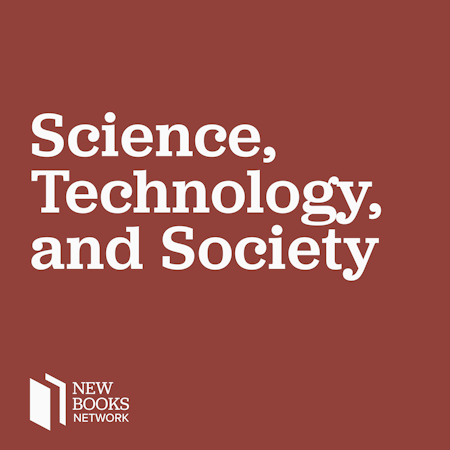
New Books in Science, Technology, and...
Interviews with Scholars of Science, Technology, and Society about their New Books
1901
Jinee Lokaneeta, "The Truth Machines: Policing,...
Using case studies and the results of extensive fieldwork, this book considers the nature of state power and legal violence in liberal democracies by focusing on the interaction between law, science, and policing in India...
55 min
1902
Ray Ison, "Systems Practice: How to Act In Situ...
While various systems theories have received rigorous treatments across the literature of the field, reliable and robust advice for systems practice can be somewhat harder to come by...
63 min
1903
Xiaowei Wang, "Blockchain Chicken Farm: And Oth...
Wang explores how rural China is not just adapting the technology used around the world, but innovating on it...
34 min
1904
Amalia Leguizamón, "Seeds of Power: Environment...
Leguizamón explores why Argentines largely support GM soy despite the widespread damage it creates...
58 min
1905
Soraya de Chadarevian, "Heredity Under the Micr...
What are chromosomes? And what does it mean to treat them as visual objects?
49 min
1906
Rosamond Rhodes, "The Trusted Doctor: Medical E...
Rhodes explicates the sixteen specific duties that doctors take on when they join the profession...
47 min
1907
Dale Kedwards, "The Mappae Mundi of Medieval Ic...
The Icelandic mappae mundi were a series of maps produced in the late medieval period (c. 1225 - c. 1400) that bore witness to fundamental changes in the landscape of vernacular literary culture, scientific thinking and regional geopolitics...
64 min
1908
K. C. Smith and C. Mariscal, "Social and Concep...
Social and Conceptual Issues in Astrobiology focuses on the emerging scientific discipline of astrobiology, exploring many of the humanistic issues this multidisciplinary field is generating.
68 min
1909
Sharon T. Strocchia, "Forgotten Healers: Women ...
Strocchia continues the work of her career: recentering the discourse to include the formative contributions of women in the Italian Renaissance...
28 min
1910
Marisa Anne Bass, "Insect Artifice: Nature and ...
At the book’s center is a neglected treasure of the late Renaissance: the Four Elements manuscripts of Joris Hoefnagel (1542–1600), a learned Netherlandish merchant, miniaturist, and itinerant draftsman...
49 min
1911
Jimena Canales, "Bedeviled: A Shadow History of...
Just as the demon-haunted world was being exorcized by the enlightening power of reason, a new kind of demon mischievously materialized in the scientific imagination itself....
42 min
1912
Daniel Deudney, "Dark Skies: Space Expansionism...
Deudney argues that the major result of the "Space Age" has been to increase the likelihood of global nuclear war...
71 min
1913
Laura DeNardis, "The Internet in Everything: Fr...
DeNardis shows that the policy tools and normative constructs we have built around the internet are outdated...
63 min
1914
C. Thi Nguyen, "Games: Agency as Art" (Oxford U...
Monopoly, Solitaire, football and Minecraft are all games, but for C. Thi Nyugen they are also an art form – specifically, the art form of agency...
64 min
1915
Jamie Merisotis, "Human Work in the Age of Smar...
Are robots going to be our overlords? No, we can make them our friends...
32 min
1916
John Durham Peters, "Promiscuous Knowledge: Inf...
Cmiel and Peters provides a genealogy of the information age from its early origins up to the reign of Google...
56 min
1917
Eric Rutkow, "The Longest Line on the Map The U...
Rutkow retraces the fascinating, decades-long history of the attempt to build the world’s longest highway...
49 min
1918
Anthony Hodgson, "Systems Thinking for a Turbul...
This is the second episode of a two-part conversation with Hodgson...
42 min
1919
Andrew Liu, "Tea War: A History of Capitalism i...
Liu’s book offers a fascinating new history of this ubiquitous beverage, leveraging its production, consumption, and global circulation to offer a fresh and compelling account of capitalist accumulation....
47 min
1920
M. Bekoff and J. Pierce, "The Animals' Agenda: ...
A compelling argument that the time has come to use what we know about the fascinating and diverse inner lives of other animals on their behalf...
62 min
1921
S. Myers and H. Frumkin, "Planetary Health: Pro...
Myers and Frumkin illustrate the interconnectedness of human health and the health of our planet...
41 min
1922
I. Newkirk and G. Stone, "Animalkind: Remarkabl...
In the last few decades, a wealth of new information has emerged about who animals are—intelligent, aware, and empathetic. Studies show that animals are astounding beings with intelligence, emotions, intricate communications networks, and myriad abilities...
46 min
1923
Micha Rahder, "An Ecology of Knowledges: Fear, ...
Rahder offers a rich ethnography of knowledge-making practices in Guatemala's Maya Biosphere Reserve, the largest nature reserve in Central America...
55 min
1924
Doug Specht, "Mapping Crisis: Participation, Da...
The digital age has thrown questions of representation, participation and humanitarianism back to the fore, as machine learning, algorithms and big data centres take over the process of mapping the subjugated and subaltern...
72 min
1925
M. Newhart and W. Dolphin, "The Medicalization ...
Medical marijuana laws have spread across the U.S. to all but a handful of states. Yet, eighty years of social stigma and federal prohibition creates dilemmas for patients who participate in state programs...
46 min